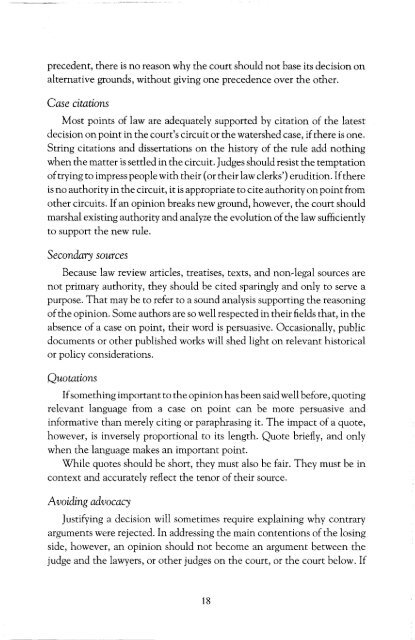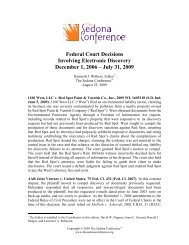Judicial Writing Manual - Federal Judicial Center
Judicial Writing Manual - Federal Judicial Center
Judicial Writing Manual - Federal Judicial Center
Create successful ePaper yourself
Turn your PDF publications into a flip-book with our unique Google optimized e-Paper software.
precedent, there is no reason why the court should not base its decision on<br />
alternative grounds, without giving one precedence over the other.<br />
Case citations<br />
Most points of law are adequately supported by citation of the latest<br />
decision on point in the court's circuit or the watershed case, if there is one.<br />
String citations and dissertations on the history of the rule add nothing<br />
when the matter is settled in the circuit. Judges should resist the temptation<br />
of trying to impress people with their (or their law clerks') erudition. If there<br />
is no authority in the circuit, it is appropriate to cite authority on point from<br />
other circuits. If an opinion breaks new ground, however, the court should<br />
marshal existing authority and analyze the evolution of the law sufficiently<br />
to support the new rule.<br />
Secondary sources<br />
Because law review articles, treatises, texts, and non-legal sources are<br />
not primary authority, they should be cited sparingly and only to serve a<br />
purpose. That may be to refer to a sound analysis supporting the reasoning<br />
of the opinion. Some authors are so well respected in their fields that, in the<br />
absence of a case on point, their word is persuasive. Occasionally, public<br />
documents or other published works will shed light on relevant historical<br />
or policy considerations.<br />
Quotations<br />
If something important to the opinion has been said well before, quoting<br />
relevant language from a case on point can be more persuasive and<br />
informative than merely citing or paraphrasing it. The impact of a quote,<br />
however, is inversely proportional to its length. Quote briefly, and only<br />
when the language makes an important point.<br />
While quotes should be short, they must also be fair. They must be in<br />
context and accurately reflect the tenor of their source.<br />
Avoiding advocacy<br />
Justifying a decision will sometimes require explaining why contrary<br />
arguments were rejected. In addressing the main contentions of the losing<br />
side, however, an opinion should not become an argument between the<br />
judge and the lawyers, or other judges on the court, or the court below. If<br />
18

















